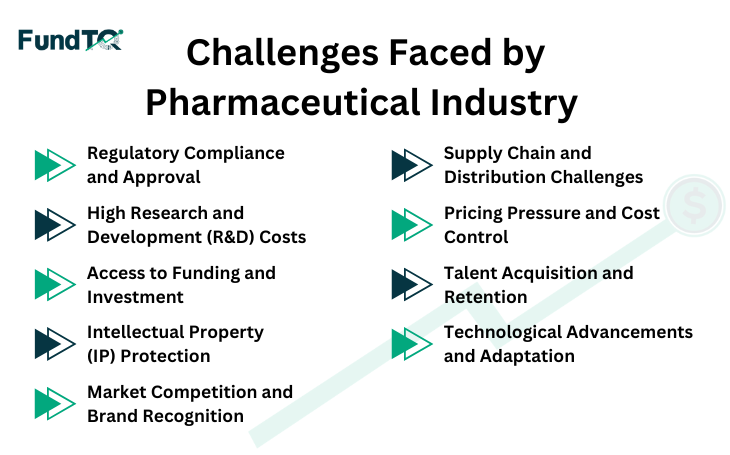Healthcare is powered by the pharmaceutical industry, but navigating through the space to reach success is an arduous road for even the start-ups. Startups in the pharmaceutical space in India suffer from unique challenges in the pharmaceutical industry that impede their capacity to scale and innovate. These are a series of obstacles for these startups to overcome, from stringent regulations to high costs.
In this article, we shall delve into nine major challenges in the pharmaceutical industry that startups must face to succeed and how to handle them along the way.
Also Read: 9 Ways of Fundraising for Startups
Challenges Faced by Pharmaceutical Industry Startups
Following are the challenges faced by pharmaceutical Industry:

1. Regulatory Compliance and Approval
For startups, one of the toughest challenges in the pharmaceutical industry is navigating regulatory approval. India follows a complex documentation, clinical trials, and inspection approval process involving the Central Drugs Standard Control Organisation (CDSCO). In India, market entry may be delayed by 2 to 3 years due to the approval of new drugs.
The cost of doing so for startups is then compounded by compliance and the expertise necessary to meet stringent guidelines. Fines, product rejections, or even lawsuits are a distinct possibility for any failure to meet regulatory requirements. For young companies trying to gain market entry, this is a major hurdle, and key challenges in the pharmaceutical industry related to compliance are only more acute when you’re working with new formulations or medical devices.
2. High Research and Development (R&D) Costs
But pharmaceutical R&D is one of the most expensive aspects of the industry. It currently takes up to ₹1,500 crore (USD 200 million) to create a new drug in India, including clinical trials, research, and testing. These financial burdens become a problem for startups, especially for those that have limited funding.
Additionally, the percentage of failure in drug development is high, and many drugs that are tested never make it through to the market because of unexpected side effects or inefficacy. Pharmaceutical industry challenges are high hurdles for startups that don’t have the financial backing of large companies. In order to overcome this, startups need to strive for strategic partnerships, government grants, and get venture capital funding to fund their R&D.
3. Access to Funding and Investment
One of the key obstacles for pharmaceutical startups is raising funding. The investment in the pharmaceutical industry faces challenges of high risk and time, and investors are usually reluctant to invest in it. Pharmaceutical startups differ from tech startups in the fact that pharmaceutical startups may need several years to bring a product to the market, and unlike companies in the tech world, they can’t generate revenue quickly.
In India, pricing regulations have made pharma investors more cautious about the risks, and such an atmosphere is hardly the right time for pharma investments. The startups need to make a strong business case, showcase their product’s potential, and show a clear pathway to profitability in order to attract investment. Valuation calculators and pitch deck templates from FundTQ can be useful tools to help pharmaceutical startups create strong investment pitches and get a good feel for the size of their market.
4. Intellectual Property (IP) Protection
Protecting initiatives in the pharmaceutical industry is a huge issue for startups, since securing patents and trademarks is difficult to begin with. Patents in India are long drawn out and expensive, taking as much as 5 years on average to achieve. Lack of intellectual property protection can mean that big competitors reproduce their products, and that can lead to erosion of the startup’s market share.
The key challenges in the pharmaceutical industry regarding IP protection are further complicated by issues like counterfeiting, especially in emerging markets. Early IP protection is key for the new pharmaceutical startups, as it guards the innovations and keeps them competitive.
5. Market Competition and Brand Recognition
The Indian pharmaceutical market is highly competitive, with domestic and foreign players competing to capitalise on it. For startups in particular, creating a strong brand that’s distinct from your competition is a difficult challenge, especially against physical giants who have deep pockets and extremely recognisable brands.
The rising interest in generics complicates competition in the pharmaceutical industry by swamping the market and making it hard for new startups to distinguish themselves.To win trust from the healthcare professionals and the consumers, these startups have to first concentrate on niche products, quality assurance, and targeted marketing strategy.
6. Supply Chain and Distribution Challenges
Pharmaceutical startups need a robust and efficient supply chain. Nevertheless, challenges in the pharmaceutical industry related to a supply chain perspective can even be demanding. Inherently, it is difficult for startups to get their hands on reliable suppliers, navigate logistics, and ultimately comply with the rule of the eyes, as it is for the highest level of agencies and the pharmaceuticals.
Infrastructure problems, transportation delays, and supply shortages in India cause supply chain disruptions. Building relationships that scale with distributors and logistics partners, coupled with investments in technology to streamline day-to-day operations, are key for businesses that are within the pharmaceutical startup space to overcome these challenges.
7. Pricing Pressure and Cost Control
The National Pharmaceutical Pricing Authority (NPPA) regulates the price of essential medicines in the Indian government. While this helps to keep medicines affordable for consumers, it also creates key challenges in the pharmaceutical industry for startups. Since startups have to operate at a government-mandated price, the margin between the price you sell on and the variable cost of labour, equipment, and energy becomes a critical factor in whether the startup survives.
Pharmaceutical startups ensure compliance with the pricing regulations by managing production costs, exploiting the advantage offered by technology in cutting down operating costs, and optimising the supply chain processes.
8. Talent Acquisition and Retention
A major challenge in acquiring a pharmaceutical startup is an inability to acquire the skilled professionals for the areas like R&D, regulatory affairs, marketing, and production. The pharmaceutical sector is in high demand of qualified talent, and sometimes it becomes hard to attract people who can match the sector and the industry level when in competition with big multinational companies offering more benefits.
9. Technological Advancements and Adaptation
There is great technological transformation occurring in the pharmaceutical industry. AI-driven drug discovery to blockchain for transparency in the supply chain, emerging technologies are transforming the way pharmaceutical companies work. But the implementation of these technologies has presented pharmaceutical industry challenges, especially for startups with limited resources.
To integrate new technologies in drug development, production, and distribution processes entails enormous upfront investment of infrastructure and expertise. While these technologies can mean better efficiencies, lower costs, and higher quality for their products for Indian pharmaceutical startups, they have to carefully evaluate the costs before committing heavily.
Also Read: Fundraising for Healthcare Startups
Conclusion
There are indeed a number of challenges in pharmaceutical industry start-ups ranging from regulatory guidelines and research and development costs-with talent acquisition to technology adaptation. It, however, does not prevent pharmaceutical start-ups from finding alternative pathways around such impediments as successful funding, strategies, and strategic partnerships. When it comes to raising funding for startups or simply to catch up on your business planning, tools like business valuation calculator and pitch deck templates can be your saviors. And these resources can be helpful to startups presenting their value proposition to investors and more broadly positioning for long-term success.





